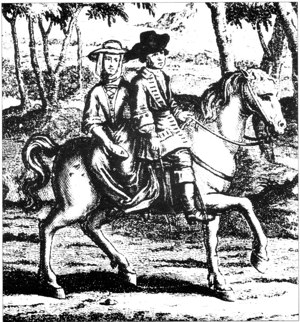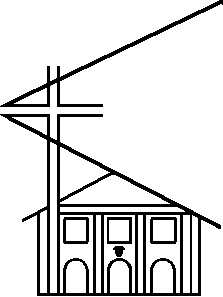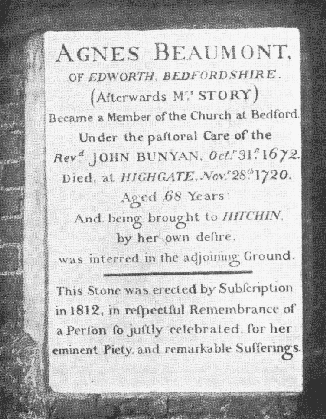On Friday [13th February, 1674], there was to be a church meeting at Gamlingay and I was very much in prayer with God to make my father willing, for in those days it was like death to me to be kept from such a meeting. So, on Friday morning, I made me ready to go. My father asked me who carried me. I said I thought Mr. Wilson [ie John Wilson, the Church's first minister], who was to call at my brother's as he went, for my brother spake with him the Tuesday before [possibly at Hitchin market]. So my father said nothing to these things.
So, when I was ready, I went to my brother's, expecting to meet with Mr. Wilson to ride behind him, and there I waited some time, and nobody came. At last, my heart began to ache and I fell a-crying for fear I should not go, for my brother told me he could not let me have a horse to go for they was all at work.

[Picture: Bunyan Museum, Bedford]
At last, unexpected came Mr. Bunyan, but the sight of him caused sorrow and joy in me; I was glad to see him, but I was afraid he would not carry me to the meeting behind him; and how to ask him I did not know for fear he should deny me. So I got my brother to ask him.
So my brother said to him "I must desire you to carry my sister today behind you."
And he answered my brother very roughly, and said "No, not I, I will not carry her." These was cutting words to me indeed which made me weep bitterly.
My brother said to him again, "If you do not carry her, you will break her heart."
And he replied with the same words again, that he would not carry me, that he would not carry me. And he said to me, "If I should carry you, your father would be grievous angry with me." Said I, "If you please to carry me, I will venture that." So with a great many entreaties at last my brother did prevail with him, and I did get up behind him. But oh, how glad I was that I was going.
But my father came to my brother's, and asked some of the men that was at work who his daughter rode behind. They answered such a one. With that, my father fell into a passion and ran down to the close end [i.e. to the end of the field], thinking to have pulled me off the horse's back; but we had gone by first.
But to speak the truth, I had not gone far behind him but my heart was puffed up with pride, and I began to have high thoughts of myself and proud to think I should ride behind such a man as he was; and I was pleased that anybody did look after me as I rode along. And sometimes he would be speaking to me about the things of God as we went along.
So coming to the town's end, there met with us a priest, one Mr. Lane who knew us both and looked of us as we rode along the way as if he would have stared his eyes out; and afterwards did raise a very wicked report of us, which was altogether false, blessed be God.
So we came to Gamlingay; and after a while the meeting began, and God made it a feast of fat things to me. Oh, how I longed that day to be with Jesus Christ; how fain [gladly] would I have died in the place, that I might have gone the next way to him, my blessed Saviour!
Well, when the meeting was done, I began to think how I should get home, for Mr. Bunyan was not to go by Edworth, though he came that way. But there was nobody could supply my wants but a maid that lived at Hinxworth, half a mile off my father's, and the ways being so dirty and deep, I was afraid to venture behind her. But I did, and so I came home ploshing through the dirt over my shoes, having no pattens [over-shoes] on.
I made what haste I could, hoping I should be at home before my father was a-bed; but when I came near the house, I see no light in it. So I went to the door and found it locked.
Then my heart began to ache with fear; but however, I went to his chamber window and called to him.
He asked who was there. "It is I, father," said I, "pray will you let me in; I am come home wet and dirty."
Said he, "Where you have been all day, go at night," and many such like things, for he was very angry with me for riding behind Mr. Bunyan, and said I should never come within his doors again, except I would promise him to leave going after that man.
So then I stood pleading and entreating of him to let me in, begging and crying, but all in vain. So then I stood a while at the window silent, and that consideration came into my mind, how if I should come at last, when the door is shut and Jesus Christ should say to me, "Depart from me, I know you not." [Matt. 7:23]
And it was secretly put into my mind to spend the night in prayer, seeing my father would not let me come in. So into the barn I went, and indeed it was a blessed night to me; a night to be remembered to my life's end. The Lord was pleased to keep scares out of my heart and, though it froze vehemently, I felt no cold.
So the morning came on and, when it was light, I peeked through the cracks of the barn door and at last I see my father come out, lock the door after him and put the key in his pocket. So when he comes into the barn where I was to serve the cows, he was at a stand to see me there with my riding clothes on, as I came home. I suppose he thought I had been gone to my brother's.
So said I to him, "Good morrow, father. I have had a cold night's lodging here; but God hath been good to me, else I should have had a worse." He said it was no matter. So I followed him about the yard and cried and hung about him, saying " Pray, father, let me go in." But I could not prevail with him. Then I prayed him, if he did not please to let me in, that he would give me my bible and my pattens. But he would not. Only one thing he said: he would never give me a penny as long as he lived; nor when he died, but would give it to them he never saw before. So I went into my brother's house to cry to the Lord, who gave me hopes of an eternal inheritance.
When Sabbath morning came, I said to my brother as we went from the meeting, "Let us go to my father's." So he consented to it. And we went and found him in the yard. "Hussif [housewife]," said he, "what do you say? If you will promise me never to go to a meeting again as long as I live, here is the key; take it and go in."
"Well, father," said I, "I will promise you that I will never go to a meeting again without your consent." So when he heard me say so, he gave me the key to go in. And so soon as I got within the door, that dreadful scripture came upon my mind: "They that deny me before men, them will I deny before my father and the angels that are in Heaven." [Luke 12:9] This was Sabbath night, a black night.


